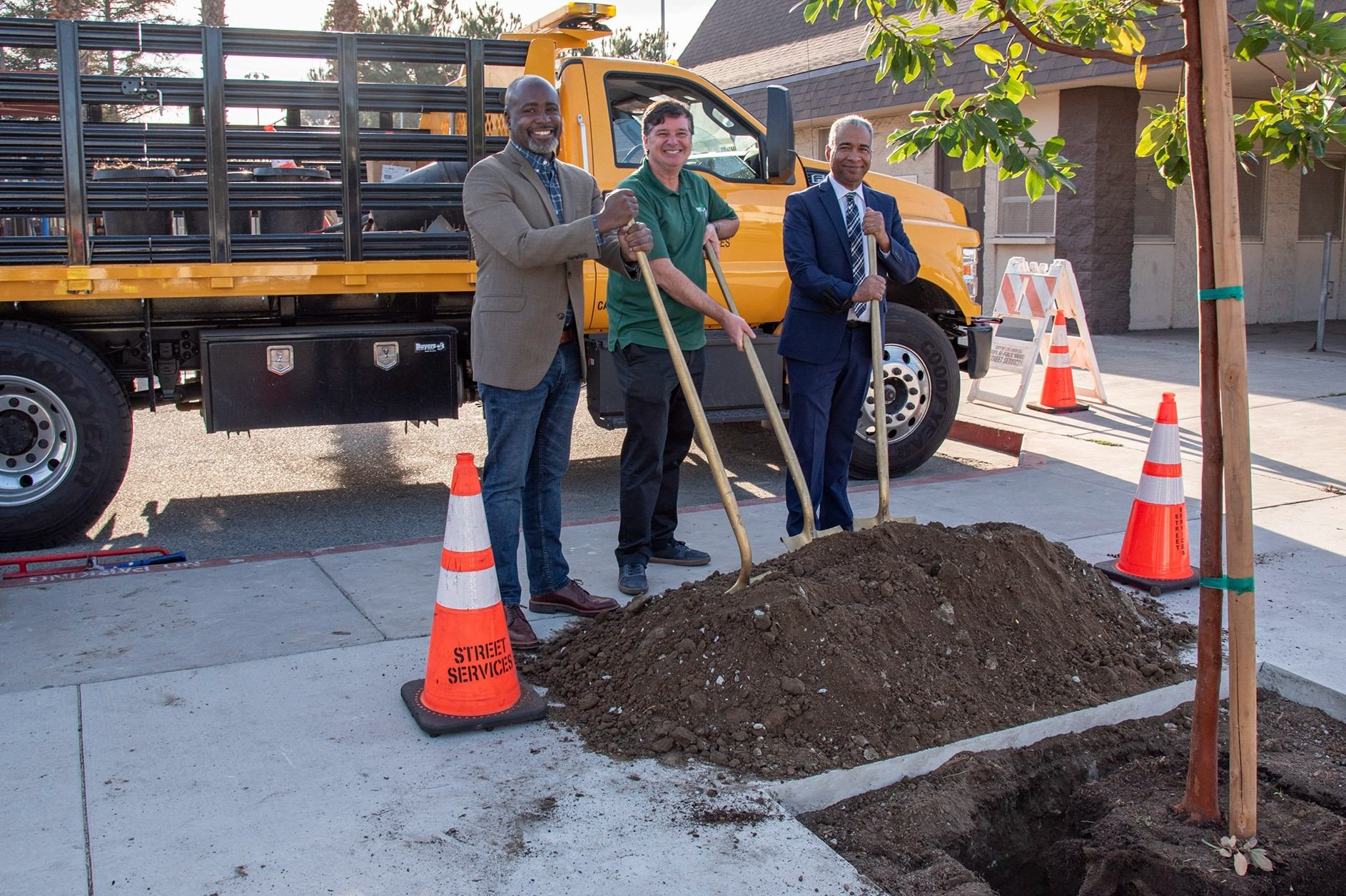Greg Spotts Is Getting LA To Net-Zero One Street At a Time
(L-R) Councilmember Marqueece Harris-Dawson, StreetsLA Executive Officer & Chief Sustainability Officer Greg Spotts, and StreetsLA Executive Director Keith Mozee announce the beginning of cool pavement work and tree plantings in a South Los Angeles neighborhood as part of the Next Phase Urban Cooling Program. Photo courtesy of StreetsLA.
Greg Spotts thrives in seeing extraordinary possibilities and making them happen. He’s helped make albums for Seal and the Goo Goo Dolls. He raised the Los Angeles Galaxy’s profile. And as cofounder of the Shortlist Music Prize, he shined a spotlight on some of the most creative albums of the 2000’s.
When Greg shifted direction from high-profile, creative arts to saving the planet through public works and transportation, a few people might have scratched their heads.
A decade later, StreetsLA is home to cutting edge sustainable street design and public services, programming including cooling pavement, electric street sweepers, an innovative bike lane maintenance program, and an online tree inventory - all of which have saved taxpayer dollars while reducing LA’s greenhouse gas (GHG) emissions and improving quality of life.
Kavi sat down with Greg to learn what’s made StreetsLA’s sustainability initiatives so successful.
How did you initially get people on board with sustainability initiatives?
Joining the agency, I didn’t come from a construction or technology background. I had to get buy-in from the staff, so I took the time to build credibility with the staff. I focused on early wins that were good for employees and the community like using mobile technology to speed up pothole repairs. We found that people were willing to jump in if they saw a positive impact.
Government is known for bureaucracy. What strategies did you use to move change forward?
I see myself as an intrapreneur within what can feel like an innovation-stifling set of bureaucracies. Sometimes we rent or even borrow equipment, vehicles, or software to pilot novel approaches. We test the waters, get feedback, work out the kinks, and build buy-in. A pilot conveys that it's not a done deal, that input is welcome. Recently we used this approach to inspect the pavement condition of 1,100 miles of bike lanes using four electric mopeds we borrowed from a company called Cake. We highlighted the project at an event where the Mayor, a Councilman, and the Vice President of the Board of Public Works jumped on the bikes and rode around the neighborhood. It was a great way to showcase the use of light electric vehicles in public works.
Another example is that we are piloting native plant gardens in medians to attract birds, butterflies and bees. Within a year of sharing this concept with stakeholders, we won $10M in competitive grant funding to implement these projects.
How did you get the word out about StreetsLA?
I say yes to every media opportunity and speaking engagement; use social media to tell positive stories with compelling photos and videos; and leverage timing, calendars and contacts where possible. Surreptitiously, the first day of laying the cool pavement coating was a very warm Saturday, and every local television station was looking for hot weather stories. I kept returning to the site for another shoot - my kids were like “Dad you need to get on TV!”. When a French wire service covered cool pavement, the story ran in nine languages around the world. People are excited about these programs and it’s important to let the world know about the work we’re doing. Hopefully it will inspire similar programs in other cities - just as we’re inspired by emerging and innovative practices around the world.
Building on LA’s efforts to mitigate climate change and reduce urban heat, StreetsLA installed cool pavement and planted shade trees on 200 city blocks in eight underserved communities. Photo courtesy of StreetsLA.
What advice would you give to others who are working to integrate sustainability into their workplace?
On a daily basis, each member of your team is either leaning in or leaning out, even incrementally. Our job is to inspire them to lean in and get excited about greening the city, one corner at a time.
Meet people where they are and identify what’s important to them - people are willing to make change if it makes their life easier.
Look for practical solutions that can be implemented in the near term.
Authorship creates ownership - give more opportunity and ownership to people on your team.
Recruit the person most likely to be resistant to change to be in charge of the innovation initiative. Identify the skills and strengths they bring to the work that will lead to success. Support them in succeeding.
Enlist thought leaders and community members to join the mission.
Tell the story of where you are, where you’re going, and why it will be better for everyone when you get there.
It’s easy to fall into the trap of thinking that as the leader, I must have all the answers, but it’s essential to welcome ideas and expertise from every level of the organization and from the outside too. I came into StreetsLA with a background in consulting and performance management, and it’s only because of the experts we have on our team that we’ve developed and implemented great sustainability initiatives.


